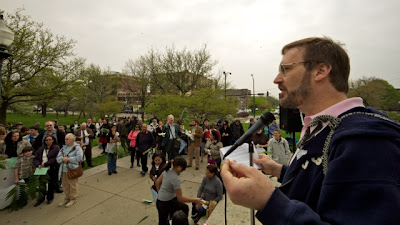I don't really know Spanish -
No -- wait a minute -- yes I do!
And so this post is dedicated to Pastor Ramon Nieves.
Pastor Ramon passed away suddenly just over two years ago. He had been the pastor of Humboldt Avenue Methodist Church in Chicago, and one of the prime movers behind a coalition of congregations that came to be called the Logan Square Ecumenical Alliance.
 |
| Pastor Ramon with other LSEA pastors. |
Pastor Ramon cut to the chase: "When we do activities like Occupy Palm Sunday together, we should use both English and Spanish."
It made sense to me. In fact, I had been trying to learn a little bit of Spanish ever day -- albeit at a hilariously slow pace. (When I mentioned the name of Chicago's free Spanish daily to my Spanish-fluent nephew and told him proudly that I was learning the language, he gently broke it to me, "OK -- lesson number one: Say "oy," not "hoy" -- the h is silent . . . . " )
Undaunted, I got a friend to do a word-for-word translation of a presentation I was to give on Palm Sunday in 2012, and coach me so that I could stand before the crowd and say, "Usted no tiene una problema de la PRODUCCION.... tiene una problema de DISTRIBUCION!"
As anyone who has tried this trick knows, toting out a few well-practiced sentences in a language you don't know well can only have one consequence: people then talk to you in that language and you are faced with the need to either pretend that you understand, or explain that actually you really don't speak the language and you were only pretending just now -- either way, it's not pretty.
And so it was a few months later at another LSEA event that I found myself standing next to Pastor Ramon. He introduced me to a friend of his from Venezuela, and then proceeded to tell us a story in Spanish, looking alternately at each of us. I smiled and nodded my head, trying to make myself as much of a passive bystander as possible; then, when there was a momentary lull, I leaned toward Pastor Ramon's ear.
 |
| Ramon and Yolanda Nieves |
Pastor Ramon looked back at me with those glittering eyes of his -- anyone who knows him knows those glittering eyes -- and said with a smile, "Sure you do . . . . "
. . . which I took to mean, "You may not understand every word, you may feel uncomfortable, you may have to spend time later trying to figure it out or to humble yourself now and ask for help; you may have to work at it. But in the long run . . . a Spanish speaker is what you are . . . because that's the community you're a part of!"
And that's certainly true in Chicago, where I was living then, and in California, where I'm living now. And it's becoming true for the entire US. The US story is truly becoming an American story.
Pastor Ramon fundamentally changed by orientation to community and to what it means to be an "American." His message to me was, Don't start from what you "can" and "can't" do. Start with where the other members of your community are, and join them there.
And so when I pray, "Danos hoy nuestro pan de cada dia" I say "oy" just like my nephew taught me, and when I pray, "tuyo es el poder" I remember how I heard my pew-mate in Chicago pronounce that r . . . .
Don't speak Spanish? Sure I do . . . .
Related posts
 I believe when Jesus broke the bread and poured the wine and said "Remember me this way," he was much more interested in encouraging us to keep having conversations -- conversations that really matter -- with others . . . and finding ways to be in relationship with our neighbors . . . all the while reminding us "never underestimate the power of food" . . .
I believe when Jesus broke the bread and poured the wine and said "Remember me this way," he was much more interested in encouraging us to keep having conversations -- conversations that really matter -- with others . . . and finding ways to be in relationship with our neighbors . . . all the while reminding us "never underestimate the power of food" . . . (See Get Outside Your Comfort Zone and Have A Conversation Today (Welcome to the Ministry))
 It will take me multiple posts to spell out everything that I feel needs to be said about the Ayotzinapa 43. People in the US need to work to change their own attitude about Mexico, and about the culpability or all of us here in the US in the wrongs that are being done down there. The Ayotzinapa 43 were persecuted for saying "the future can be different." It's time for us to take up their cry.
It will take me multiple posts to spell out everything that I feel needs to be said about the Ayotzinapa 43. People in the US need to work to change their own attitude about Mexico, and about the culpability or all of us here in the US in the wrongs that are being done down there. The Ayotzinapa 43 were persecuted for saying "the future can be different." It's time for us to take up their cry.(See Ayotzinapa43: US People Need an Attitude Adjustment )
 I dedicated Indigenous Peoples Day 2015 to making some progress towards writing about the perspective of indigenous peoples in the Americas.
I dedicated Indigenous Peoples Day 2015 to making some progress towards writing about the perspective of indigenous peoples in the Americas.How do you observe Indigenous Peoples Day?
(See Reflections on Indigenous Peoples Day 2015)

No comments:
Post a Comment